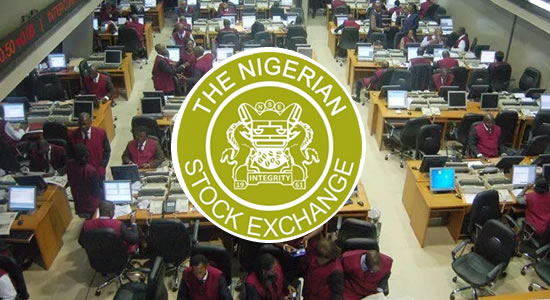Despite the bearish trend that prevailed in the equities market on the Nigerian Stock Exchange, NSE, for the most part of March 2018, activities in the market ended the first quarter, Q1’18, on a bullish note, resulting in N1.38 trillion gains to the investors. Review of transactions in the market for the quarter showed that the market capitalization, which represents the total value of investors’ assets was up 10.17 percent to N14.993 trillion from N13.609 trillion at the beginning of the year.
Also, the All Share Index, ASI, which mirrors the performance of the market in terms of equity price movement closed higher at 41,504.51 points compared to 38,243.19 points at the beginning of the year, thus representing 8.53 percent growth in Q1’18.
However, the industrial goods and banking sectors both outperformed the index, closing at 10.96 percent and 9.49 percent for the two parameters respectively, a development capital market operators attributed to outcome of policy initiatives in the sectors.
Operators who spoke on the market performance, especially the stellar performance by the industrial goods and banking sectors, said that both sectors rode on the back of regulatory protection by the Government and their primary regulators to deliver the performance.
Though they argued that the market would have done better given a clear cut policy in certain areas of the economy, they posited that the overall performance of the market was impressive.
They averred that the inability of the Monetary Policy Committee, MPC, members to sit due to non-constitution of the committee slowed activity in the market.
Sectorial performance
The industrial goods sector outperformed others, rising 10.96 percent, followed by the banking sector, which rose by 9.49 percent.
The insurance sector, which has been enjoying a lot of liquidity since the review of the par value rule by the Nigerian Stock Exchange, NSE, in January, placed third with 8.41 percent increase.
The oil and gas sector ranked fourth, rising by 4.9 percent, while the consumer goods sector rose marginally by 0.21 percent.
Top five gainers
The top five gainers are: Caverton Offshore Support Plc, rising by 106.8 percent, Cement Company of Northern Nigeria Plc, 196.8 percent; Neimeth Pharmaceuticals Plc, 93 percent; Wema Bank, 90.4 percent and Med-View Airline Plc, 75 percent.
Top five losers
The top five losers are: Unic Diversified Holding Plc dropping by 64 percent, Courteville, 52 percent; Equity Assurance Plc, 34 percent; Consolidated Hallmark Insurance Plc, 34 percent and Cornerstone Insurance Plc 26 percent.
Operators react
Seyi Abe, Managing Director, Magnartis Finance and Investment said, “Activity in the market for the Q1’18 was sideways despite the fact that we are in the earning season and prices are supposed to be going up.”
He noted that the trading in the market was largely based on speculation and spillover effect of 2017 rally during the quarter due to failure of the MPC to sit.
“You are aware that the members of MPC were not able to sit throughout this quarter. It is a major impediment to upside activity in the market.
“Last month, they were appointed and approved and the Central Bank Nigeria, CBN Governor, Mr. Godwin Emefiele, said that the MPC will in the next one week meet. We expect a whole lot of things to start happening from there.
“It was a bullish quarter, which was a direct correlation with what is happening in the economy. We believe that if we have a clear direction of where the economy is going, the market will react accordingly depending on what policy the MPC is bringing on board.
“For instance, there have been speculations of lower interest rate but the MPC needs to come out clear and tell us about these policies so that the market can react successfully.”
On the performance of the industrial goods and banking sectors, he said: “the industrial goods sector is skewed directly towards the economy and if economy is doing well, it does well as well.
“The banking sector reacts to the various policies within the fiscal and monetary policies. So, the sector would have done even better if there was a clear cut monetary policy within the quarter.”
In his reaction, Mr. Charles Fakrogha, Chief Operating Officer and stockbroker with Foresight Securities and Investment Management, also adjudged the market performance for the quarter good.
He, however, said that the fact that the MPC did not meet during the quarter did not have any material impact on the market.
He said: “In January, we saw a lot of activities in the market; we saw so much return. Of course, at a point, the Nigerian equities market was adjudged one of the best performing in the world and that tempo was due to the positive ratings by some international rating agencies and that tempo continued for quite some time.
“It was also sustained as a result of the earning reports of the companies that hit the market.
“Overall, I will say the first quarter has done well; activity has been very good. The market does not operate in isolation; it reflects the larger economy.
“What you see in the market is basically a reflection of what is happening in the Nigerian economy.
“However, towards the end of February and March, we saw a reverse of the situation.”
On the performance of the banking sector, Fakrogha said:
“The banking sector did very well as a result of the regulators – the Securities and Exchange Commission, SEC, and the Central Bank of Nigeria, CBN, ensuring that institutions play by the rule.
“We saw how the regulators stepped in the payment of dividend for the banks in relation to the percentage of their Non-Performing Loans, NPLs.
“So, you can see that this made most of these banks to really do what they were expected to do and we saw their numbers.”
For the industrial goods sector, he said:
“Of course, the Government of the day has always been insisting on industrialization and manufacturing. They have done a lot in terms of encouraging manufacturers.
“So, it has outperformed the All Share Index due to Government’s interest in the sector.”





















